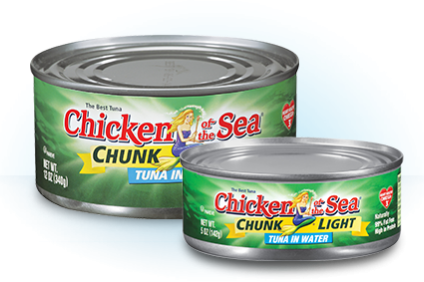
Thai Union Group-owned Chicken of the Sea has hit back at a campaign by Greenpeace to encourage retailers and foodservice companies in the US to stop selling brands of tuna produced by firms that refuse to “drop opposition to sustainability”.
Greenpeace urged Chicken of the Sea to “clean up its act” in an open letter to retail bosses, in which the oceans director of Greenpeace US, John Hocevar, said “the big three major tuna brands, which control approximately 80% of the US market, don’t offer a single sustainable tuna product under their flagship brands”.

Discover B2B Marketing That Performs
Combine business intelligence and editorial excellence to reach engaged professionals across 36 leading media platforms.
“Chicken of the Sea continues to supply destructive tuna,” Hocevar claimed. “It is time for US retailers and foodservice companies to follow the UK’s lead and demand Chicken of the Sea improve or start cancelling contracts.”
The moved was designed to increase pressure on manufacturers such as Thai Union – and followed a decision by Tesco to remove some Thai Union-owned John West tuna products from its UK stores because the brand failed to meet the retailer’s sustainability standards.
However, Chicken of the Sea told just-food yesterday (3 August) both it and its parent firm were “committed to operating in an environmentally and socially-responsible manner”.
A Chicken of the Sea spokesperson said: “We share Greenpeace’s concerns about the sustainability of our oceans. However, Greenpeace continues to fail to recognise the work we have done and are currently doing to ensure our products are brought to market in a way that is consistent with our commitment to operate with integrity, promote sustainability through our entire supply chain and work collaboratively with stakeholders to develop science-based solutions to industry-wide challenges.”

US Tariffs are shifting - will you react or anticipate?
Don’t let policy changes catch you off guard. Stay proactive with real-time data and expert analysis.
By GlobalDataThe brand continues “to go to great measures to ensure our seafood is responsibly caught, including encouraging fleets to adopt non-entangling fish aggregating devices (FADs) using best practices recommended by the International Seafood Sustainability Foundation”, the spokesperson said.
“Unlike Greenpeace, we do not believe tuna sustainability is about limiting specific types of fishing gear in fact, it’s much greater,” the spokesman said. “We believe sustainability will be best achieved by using a mix of responsibly-managed fishing methods, and a commitment to the long-term health of our oceans. Sustainable oceans are dependent upon healthy and vibrant levels of seafood, which is why marine conservation projects are just as important as catch methods.”
Thai Union is working through Sea Change, its “global sustainability strategy, to stabilise and improve the fish stocks that we depend on”, the spokesperson said.





